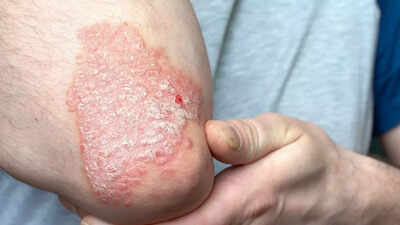ARTICLE AD BOX

Psoriasis is a chronic inflammatory skin condition affecting millions of people worldwide. It causes red, scaly patches, itching, and discomfort, impacting both physical and mental well-being.
While genetics and immune system factors play a role, research shows that lifestyle choices, particularly diet, can influence the severity and frequency of flare-ups.A study published on PubMed Central highlights the role of nutritional therapy in managing psoriasis. The research suggests that incorporating anti-inflammatory foods such as fruits, vegetables, whole grains, and omega-3-rich fatty fish can help reduce inflammation.
Conversely, processed foods, high-fat dairy, and red meat may worsen symptoms by promoting inflammation.Understanding the link between diet and psoriasis allows individuals to make informed choices that support both skin health and overall well-being. This article explores 6 ways to adjust your diet according to research-backed recommendations to reduce inflammation, improve skin health, and complement medical treatments for psoriasis.
Psoriasis diet tips: 6 ways to reduce inflammation and improve skin health

Embrace anti-inflammatory foods
Incorporating anti-inflammatory foods into daily meals can help calm psoriasis-related inflammation. Colourful fruits like berries and citrus, and vegetables such as spinach, kale, and broccoli, are rich in antioxidants that protect skin cells from damage.Fatty fish, including salmon, mackerel, and sardines, are excellent sources of omega-3 fatty acids, which have been shown to reduce inflammatory markers in psoriasis patients.
Eating these foods regularly may help manage flare-ups and improve overall skin appearance.
Limit saturated fats and processed foods

The PMC study emphasises that saturated fats and heavily processed foods can trigger inflammation and worsen psoriasis symptoms. Red meat, fried foods, full-fat dairy, and packaged snacks are common culprits.Replacing these with healthier fats, such as olive oil, avocados, and nuts, can provide essential nutrients without increasing inflammation.
Reducing processed food intake also supports general well-being and energy levels.
Incorporate vitamin-rich foods
Vitamins play a crucial role in maintaining skin health. Vitamins A, C, and E, along with selenium, have antioxidant properties that protect skin cells from oxidative stress.Including a wide variety of colourful fruits and vegetables ensures adequate vitamin intake. Carrots, bell peppers, berries, and leafy greens are excellent options that support the immune system and may help reduce psoriasis flare-ups.
Maintain a healthy weight

Maintaining a healthy weight is linked to fewer psoriasis flare-ups. Excess body fat can increase inflammation, exacerbating symptoms and affecting joint health for those with psoriatic arthritis.A balanced diet, portion control, and regular exercise can help achieve and sustain a healthy weight. This strategy improves overall health and may enhance the effectiveness of prescribed psoriasis treatments.
Stay hydrated
Proper hydration is essential for skin elasticity and overall health. Drinking enough water daily helps prevent dryness and flakiness, which can worsen psoriasis symptoms.Incorporating hydrating foods like cucumbers, watermelon, oranges, and other fruits and vegetables can complement water intake and provide additional antioxidants that benefit the skin.
Consider gluten-free options

Some individuals with psoriasis may be sensitive to gluten, which can trigger inflammation.
Research in the PMC study suggests that a gluten-free diet may reduce flare-ups in those with gluten intolerance or sensitivity.Before making any major dietary changes, it is important to consult a healthcare professional to ensure nutritional balance. Tailoring your diet to your personal needs can be an effective complement to medical treatment.Diet plays a significant role in managing psoriasis alongside medical treatments.
Incorporating anti-inflammatory foods, reducing processed and high-fat items, consuming vitamin-rich produce, maintaining a healthy weight, staying hydrated, and considering gluten-free options can all help reduce inflammation and improve skin health.These six dietary strategies empower individuals to take an active role in managing psoriasis. Thoughtful nutritional choices can decrease flare-ups, enhance quality of life, and support long-term skin wellness.For those looking to combine lifestyle management with professional treatment, following these research-backed dietary tips offers a credible path toward healthier skin and overall well-being.Disclaimer: This article is for general informational purposes only and is not a substitute for professional medical advice, diagnosis, or treatment. Always seek the guidance of a qualified healthcare provider regarding any medical condition or lifestyle change.Also read| How to make hair grow thicker according to Ayurveda: Natural remedies backed by science



.png)
.png)
.png)
















 15 hours ago
4
15 hours ago
4







 English (US) ·
English (US) ·